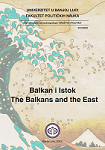ЗAЧЕЦИ ПОЛИТИКЕ „МЕКЕ МОЋИ“ РУСИЈЕ ПРЕМА БОСНИ И ХЕРЦЕГОВИНИ НА ПРИМЈЕРУ ДЈЕЛОВАЊА АЛЕКСАНДРА ФЈОДОРОВИЧА ГИЉФЕРДИНГА
THE BEGINNINGS OF RUSSIA’S “SOFT POWER” POLICY TOWARDS BOSNIA AND HERZEGOVINA BASED ON THE EXAMPLE OF ALEKSANDAR FEDOROVICH GILJFERDING
Author(s): Vlade SimovićSubject(s): Diplomatic history, Political history, Government/Political systems, Studies in violence and power, 19th Century, Geopolitics
Published by: Fakultet političkih nauka Univerziteta u Banjoj Luci
Keywords: Alexander Fedorovich Gilferding; “soft power”; Orthodoxy; Slavophilism; Russia; Bosnia and Herzegovina;
Summary/Abstract: The paper investigates the diplomatic mission of Alexander Fedorovich Gilferding, the first Russian consul in Sarajevo (1857-1858) and his contribution to establishing and shaping the concept of “soft power” of Russia as a model of their geopolitical action towards Bosnia and Herzegovina. With his diplomatic and, later, literary and scientific work, Gilferding opened Russia to the Serbian Orthodox population in Bosnia and Herzegovina. To the same extent, he revealed the Serbian Orthodox population in the then Ottoman Bosnia and Herzegovina to the Russian public. The basic thesis of this paper is that Gilferding, in the spirit of Slavophilism, in a little more than a year of his diplomatic mission, laid the foundations of Russian policy towards Bosnia and Herzegovina as a kind of “soft power” concept. By helping the educational and cultural activities of Serbs in Bosnia and Herzegovina, Gilferding contributed to the construction of Serbian national identity. Similar to Gilferding, contemporary Russian elites, through the mechanisms of “soft power”, exert a strong influence on political processes and the pro-Russian sentiment of Serbs in Bosnia and Herzegovina. Given that other great powers are also competing in the process of achieving influence and power in Bosnia and Herzegovina, the present irresistibly reminds us of the period of post-Crimean Europe and strong diplomatic activities in Bosnia and Herzegovina in the 19th century.
Journal: Društvo i politika
- Issue Year: 3/2022
- Issue No: 3
- Page Range: 7-28
- Page Count: 22
- Language: Serbian

